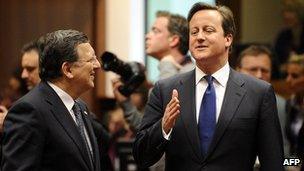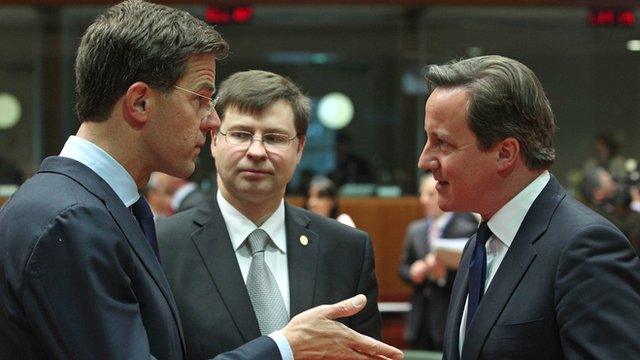Europe's push against tax fraud gains momentum
- Published
- comments

Will Mr Cameron and the EU convert words into action on tax evasion?
David Cameron began his day by restating his position that he not only wants to reform the European Union but that Britain was better off in a reformed EU.
Today is an example of how work gets done in Europe. There is what is called a "thematic summit". There are two main items on the agenda: tax evasion and energy. They will be discussed over lunch and five hours later the motorcades will be heading for the airport or the Gare du Midi.
Over tax fraud David Cameron has allies. He wants global action against what he has described as "staggering" losses to the national exchequers. It is estimated in the EU that 1tn euros ($1.3tn; £0.85tn) are lost each year due to tax fraud. Mr Cameron wants to adopt the US proposal of an automatic exchange of tax-related information. He also wants major companies to report tax payments on a country-by-country basis. This is to prevent shifting income to those places with the lowest tax rates.
On arrival in Brussels Mr Cameron said "we've got to make sure that as we set those tax rates that companies pay taxes and that means international collaboration, sharing of tax information".
On one level it is easy to find co-operation on this. The mood of the times has changed. With so many countries cutting spending in Europe it is very appealing to go after tax fraud. Also a combination of activists and hackers have exposed how multinational companies evade taxes.
There are, however, sceptics about this. They point out that commitments have been made before to tackle tax havens. The Italian Prime Minister, Enrico Letta, for one, has spoken of "the incredible hypocrisy" on a European level.
There are still countries like Austria and Luxembourg which are resisting sharing information, although the Austrian Chancellor Werner Faymann said today "we want united rules... it's an injustice and we have to act jointly against tax fraud".
How determined is UK?
Within the EU there are those who say that Britain has not cleaned up its tax havens. David Cameron has written to UK "dependencies" and told them to embrace tax transparency - but that is a long way from ensuring it will happen.
In the UK there is controversy about Google and the tax it pays. Ed Miliband, the Labour leader, said today "I can't be the only person here who feels disappointed that such a great company as Google, with such great founding principles, will be reduced to arguing that when it employs thousands of people in Britain, makes billions of pounds of revenue in Britain... that it should pay just a fraction of one per cent of that in tax."
The Labour leader challenged David Cameron as to whether he had raised this issue with Eric Schmidt of Google earlier in the week.
The British believe that clamping down on fraud is best done at a global level, with further agreement at the G8 meeting next month and then later with the G20.
It will be interesting to see whether some European states or EU officials try and develop their own alternative standard with Europe-wide legislation. It will be a test whether on an important issue Europe can be pragmatic and flexible in its decision-making.
The summit will also discuss energy. It is a vast subject and vital to the future of Europe and its economies.
Today is for talking rather than decision-making. The challenge is this: the United States has embraced shale gas and the technique of fracking. It already delivers 25% of America's energy needs, at a cost which gives the United States a real advantage over Europe. The question is not just about whether to back fracking; it is also whether Europe and its decision-making is nimble enough to develop cheaper and more reliable sources of energy.
- Published22 May 2013

- Published21 May 2013